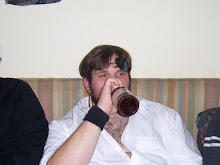27.5.10
George A. Romero's SURVIVAL OF THE DEAD
It seems that with each new installment of his "Dead" films, Romero further solidifies his reputation as the king of so-called "serious" zombie cinema. He is more focused than ever on his life's work and his humanist message. His films have always had a political bent to them, but he seems more conscious of this than ever with his previous film DIARY OF THE DEAD and his new epic, SURVIVAL OF THE DEAD. The main difference is that he's lost a bit of his cynicism regarding the human race - there's a streak of actual hope in his recent efforts, and his focus (particularly since DAY OF THE DEAD) on the possibility that the undead might have their old memories lurking underneath all that decaying flesh and insatiable hunger has really lent itself to the morality at play in the whole "should we kill them or wait to find a cure" conundrum that sits at the heart of all standalone zombie films (as if no one had ever seen a zombie movie before). In this regard, he's become a storyteller of great empathy, somewhat akin to a latter-day, splatter-centric and less technically masterful Kurosawa, who sees the potential in humanity through all its ugliness.
I've been following and writing about Romero's series for quite some time now, and I'm sorry to say it, but this film is most certainly the beginning of the end. SURVIVAL OF THE DEAD is Romero's sixth zombie film, and again the odds are on the dead overrunning the living. SURVIVAL marks two major departures for the director, as well as the series: it's essentially a take on the Western (a showdown between two feuding families on an island over what to do with the dead forms the central conflict of the piece), and it features a character from another film in the series, Sarge Crocket, the National Guardsman who hijacks the protagonists' RV in DIARY.
This really opens up the universe of the series, and fulfills the hopes (somewhat) of late film-theorist Robin Wood, who wrote of DIARY that he hopes to see characters from that film populate later films, though he was speaking mostly in the context of the militant blacks who had taken over the town and supplied the kids with a lot of the stuff that got ripped off by the National Guard. I agree, that would be one of the more interesting sets of people to make a zombie movie about, especially in Romero's super-charged politically relevant mythology.
The plot is pretty basic - in an Earp/McLaury scenario, the island two families of Irish immigrants live on isn't big enough for the both of them, so one has to go. Forced off the island, Patrick O'Flynn takes to ripping off people for passage via boat to the island, which is apparently unknown to anyone who doesn't live in the area. Sarge and the crew he ends up with encounter O'Flynn while trying to flee the mainland, and end up bringing him back to the island. The morality play picks up and goes from there, ultimately ending in a bloodbath, but one that has some real ramifications for where the series goes in the future (Romero has said he only wants to do one more, but we'll see if that's adhered to, or not), particularly in regard to the undead's apparent ability to remember their family members, though this ends with tragic consequences.
SURVIVAL OF THE DEAD has been heralded as a let-down by both non-fans and admirers of Romero, but really it's not the bore-fest it's been purported to be. Like most Romero films, there's a healthy layer of cheese that covers everything, from the over-the-top kills and the self-important dialogue (a way of interpreting other "end of the world" films' overwrought mental masturbation, in my opinion, and often bad on purpose), but none of this should be a surprise to anyone who's followed the director's films since CREEPSHOW.
He's a pulp-infused storyteller, more akin to a schlocky EC comic than anything cerebral and "intellectually engaging" on traditional levels. Part of the pleasure of watching SURVIVAL is seeing how Romero blends and synthesizes genre, undermines his own supposed legacy, and continues building upon both at the same time. It may well be the weakest of the "Dead" series, but when you're discussing any horror movie in the same breath as NIGHT, DAWN or the under-appreciated DAY OF THE DEAD, that's not exactly saying anything revolutionary in thought. Compared to the original three films, almost all horror films are completely inferior, and not just those featuring the beloved lumbering undead.
Edit - 5/28/10 3:10 PM:
Check out this interview with Romero that's really quite interesting.
Subscribe to:
Post Comments (Atom)

.jpg)



No comments:
Post a Comment